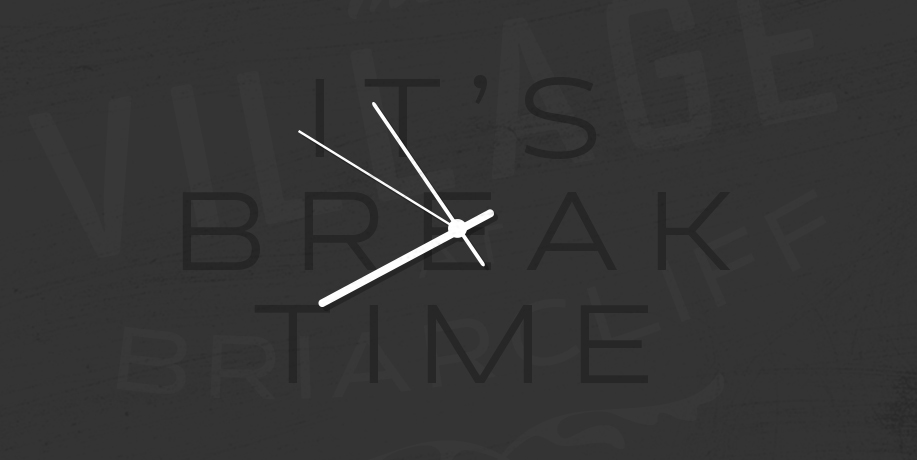
Take a break. Take a breath. Happiness and enjoyment are improved by breaks! Fantastic! That’s right, you will get more enjoyment out of something if you take a break, just not during the tasks you dread having to perform.
Imagine getting a massage, if given the choice of an uninterrupted 30-minute massage or a 1 minute break in a 30-minute massage, which would you choose? Likely, uninterrupted, however it’s actually not as enjoyable as it would be with the break, in conclusion of a study about disruption. Here’s why:
According to a 2008 study, Leif Nelson and Tom Meyvis conducted; taking a break disrupts the adaptation process. The study asked participants to imagine having the choice of a massage uninterrupted or a massage with a brief break in the middle, which would they choose? The majority chose the uninterrupted massage, not considering the adaptation process, instead overestimating sensitization (the increase of intensity by a stimulant; i.e. fine wine). Taking the break in the middle of the massage interrupted the adaptation which made the intensity of the massage (stimulant) more impactful because the enjoyment of the second half of the massage was as enjoyable as the beginning. To test this, Nelson and Meyvis had subjects sit in a massage chair for 3 minutes. One group sat through the entire 3 minutes uninterrupted while the other group had a 20 second break in the middle and then resumed the massage. They asked the participants to rate their enjoyment of the last two minutes and only those minutes. The group with the break described the enjoyment and intensity higher than those uninterrupted. However, several participants rated the entire massage and not the last two minutes.
The reason for the heightened enjoyment of the massage came from the disruption of adaptation. This created two positive experiences, not having adapted to the feeling of the chair massaging their muscles. Chairs are different and not as enjoyable as the Spa at Briarcliff.!
Adaptation is the decrease in the intensity of an experience. Unless it’s high-quality wines, which gets better and intensifies the longer you have it…and you’re painting. Adaptation is helpful for a lot of reasons and is necessary, to an extent. To adapt to temperature is necessary for your body in order to maintain its proper functions. Adaptation is the body’s equivalent to the brain tuning out sound. Imagine being in the light of mid-summer sunshine; at first you feel your eyes were just burned in the brightness of the day but eventually the sunlight isn’t as harsh on your eyes because you’ve adapted. One of the best ways to help your eyes adapt is to protect them from the harsh sun, Budget Blinds in the Village at Briarcliff can help save those important peepers of yours. Budget Blinds offers a variety of style and lighting/shading options.
Still not convinced a break is helpful in the middle of a positive experience? You’re eating your favorite ice cream flavor for a special occasion, or because it’s Thursday, but instead of stopping and waiting until another occasion or next Thursday, you only eat that flavor of ice cream. Would the flavor be as rich on your tongue in a few hours as it was the first few bites? Eventually, the ice cream wouldn’t have a flavor, it’d just make you sick with all of the sugar. That’s adaptation. The intensity of the taste and the enjoyment of eating your favorite ice cream flavor falls significantly, until it is bland and not enjoyable.
Take a break from eating the ice cream and the next time you take the first few bites will taste much better because you disrupted the adaption of taste to the flavor. You save your sweet treat to enjoy another time.
Breaks make the good times more enjoyable, but what does a little more enjoyment mean in the grand scheme of life? Glad you asked! Enjoyment makes you happy and happiness results in success. To increase happiness, and therefore success, start saying yes to more opportunities and experiences. “Yes” is not as well known to this day and age unlike its counterpart, “no.” Saying yes to more things will create more moments of happiness, just little ones, that will add up to greater satisfaction and overall happiness than if you had just a few large moments. Nelson and Meyvis showed that when we get used to things, those things give us less pleasure. We start taking for granted what once brought much pleasure and happiness. By breaking pleasurable and enjoyable things up and doing lots of small, different pleasurable things, we’d get more enjoyment overall and feel happier. Small things to say yes to are seemingly nothing in terms of making you happy long-term, but a lot of short-term enjoyable moments add up to long-term happiness. Say yes to going to the movies, to going out with friends even if you’re tired, see your families more, eat out at a new restaurant or a familiar one, but say yes more than you say no. Try it for a week; and feel great.
The Village at Briarcliff is your one-stop-shopping center for whatever your needs and enjoyment/happiness of life. Shop. Dine. Relax, in the Village.
Sources:
Nelson, Leif D., and Tom Meyvis. “Interrupted Consumption: Disrupting Adaptation to Hedonic Experiences.” Journal of Marketing Research45.6 (2008): 654-64. NYU. Web. 13 Jan. 2016.
“Do Many Small Pleasures Beat Fewer Larger Ones?” Barking Up The Wrong Tree. Psyblog, 04 Nov. 2011. Web. 14 Jan. 2016.